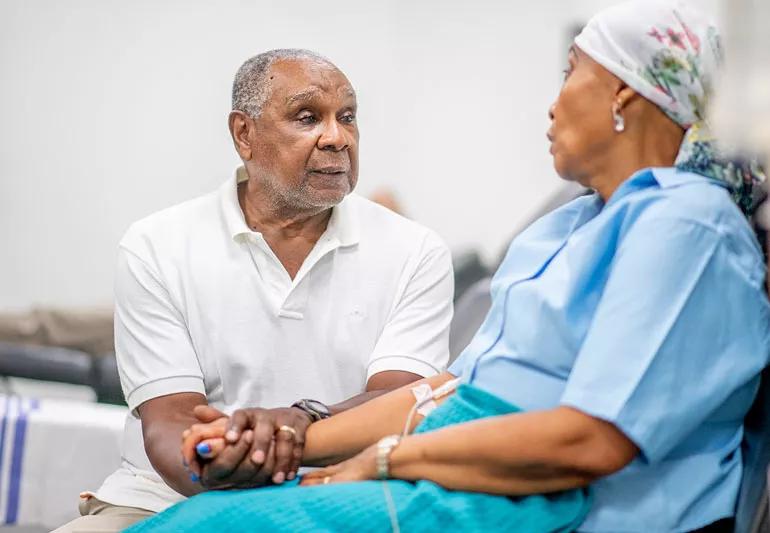The first step is making a commitment to communicate

Image content: This image is available to view online.
View image online (https://assets.clevelandclinic.org/transform/a10c3693-0c63-4f2e-bc00-6297bd2812ef/spouseCancer-1169640677-770x553-1_jpg)
man comforting wife receiving cancer treatment
Hearing the news that your spouse was just given cancer diagnosis can be devastating.
Advertisement
Cleveland Clinic is a non-profit academic medical center. Advertising on our site helps support our mission. We do not endorse non-Cleveland Clinic products or services. Policy
Your first thought might be how you can help and support them through this life-changing diagnosis and the coming treatment.
“You may feel completely unprepared to help your partner,” says cancer care nurse Josette Snyder APRN, MSN, AOCN. “But know that you are in a position to make an enormous impact on their experience of treatment and recovery. It may feel like an immense responsibility, but it also is a tremendous opportunity to support and safeguard your loved one as much as possible.”
Also know that people often say that caring for someone who is seriously ill is a deeply profound, gratifying and emotionally intimate experience, one that can strengthen your relationship and bring you closer.
Snyder gives some suggestions for how you can help your spouse or partner move through a cancer diagnosis and treatment:
Often, we don’t ask people what they need or want and at the same time, we don’t express what we need, either. Make a pact with your spouse or partner and say you will do your best to always be honest and open. Then, ask for the same in return.
“Agreeing at the beginning to communicate openly sets the stage for both of you to feel more comfortable sharing your feelings in the future,” says Snyder. “Don’t be afraid to show your feelings. Communicate that you are scared as well.”
Advertisement
“Consider putting other plans on hold while you both process what’s happening,” says Snyder. “You may want to spend time alone together to talk about your feelings and to make some decisions. Ask your spouse how you can help without taking away from them.”
During this time, try to plan for child care, finances, time off from work or household duties. It’s common for offers to come in from friends and family to help, so brainstorm about how to use this social network so you and your spouse can focus on treatment.
It’s possible that roles might alter, too. You may have to do some things you didn’t do before, but be sure to cut yourself some slack on that.
“Another important initial topic for discussion is how to communicate the diagnosis and other news to family, friends and, possibly, co-workers,” says Snyder. “Some people who have cancer find it stressful to break the news or talk about their illness to all but their closest friends or family members.”
Ask your partner if you can help tell the news to others and volunteer as their gatekeeper to control the flow of visitors and phone calls. This is also one of those times where people reassess spirituality, so consider having those discussions or exploring the topic.
It’s a very human response to try to ‘fix’ things when your loved one talks about feeling scared, angry or sad. Most of the time, however, the best thing you can do is simply sit and listen.
“Let them experience and articulate whatever emotion they may feel, even if it’s screaming, crying or pounding on the walls,” she urges. “Resist the thought that their emotions are aimed at you.”
Self-care is key. Devoting time to do things that give you a break from caregiving will restore your soul and maintain your health. Make time to pamper yourself through relaxing baths, reading books, taking walks and exercising.
“While it can be difficult, it’s important to keep a sense of humor and laugh when you can,” says Snyder. “Know that it’s OK to enjoy life.”
Try to maintain your routines – everything doesn’t have to focus on cancer. Your partner needs a break from disease as well. If possible, find some time to make dates at home, even if it’s just making a delicious dinner, lighting a couple candles and watching your favorite movie together.
Cancer treatment is daunting. You can help your partner immensely by taking over tasks such as scheduling appointments, calling for test results, dropping off or picking up prescriptions, shopping for comfort items or accompanying them on doctor visits and being an active participant in the appointment.
Advertisement
“Your spouse will undergo a steep learning curve after a cancer diagnosis,” she says. “You can help by learning all you can about the disease and its treatment. Plus, you also can seek advice from others who have gone through the same thing. If you have young children, find resources to help you communicate with them.”
Advertisement

Sign up for our Health Essentials emails for expert guidance on nutrition, fitness, sleep, skin care and more.
Learn more about our editorial process.
Advertisement
Communicating clear limits helps protect your time, energy and emotional well-being
Being hooked on love can cause unhealthy relationship patterns and obsessive thoughts
When someone guilt trips you, they’re using emotionally manipulative behavior to try to get you to act a certain way
This behavior is usually a sign that the other person doesn’t know how to handle conflict or is prone to being passive-aggressive
It can be harder to let go when you’ve invested time, energy and emotions — but it might be the healthier choice long term
Attachment theory suggests that your earliest relationships shape connections throughout your life
Love languages are defined by the way you prefer to give and receive affection
There are many different ways to love someone and yourself
Although it could be used as a moisturizer, this new trend is not recommended
Communicating clear limits helps protect your time, energy and emotional well-being
High cholesterol can be genetic, but testing and treatment can lower your heart disease risk